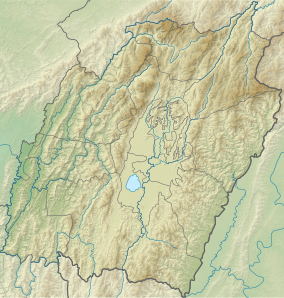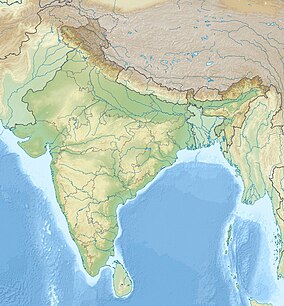Yangoupokpi-Lokchao Wildlife Sanctuary
| Yangoupokpi-Lokchao Wildlife Sanctuary | |
|---|---|
| (Meitei: Yangoupokpi-Lokchao Lamlak-ki Saa-Ngaa Ngaak Senpham) | |
 | |
| Location | Chandel district, Manipur |
| Nearest city | Imphal |
| Coordinates | 24°19′N 94°14′E / 24.32°N 94.23°E |
| Area | 184.80 km2 (71.35 sq mi) |
| Established | 1989 |
| Governing body | Government of Manipur |
Yangoupokpi-Lokchao Wildlife Sanctuary (Meitei: Yangoupokpi-Lokchao Lamlak-ki Saa-Ngaa Ngaak Senpham) is an Indo-Burma wildlife sanctuary in Chandel district of Manipur. It is in the Indo-Myanmar border about 110 km from Imphal. It has an area of 184.80 square kilometers.[1][2][3]
The ecosystem of this wildlife sanctuary is unique and vibrant. It represents the Indo-Myanmar biological diversity (Indo-Burma). It is because of the strategic location of the wildlife sanctuary in the meeting point of the two major geographical zones, India and Myanmar (Burma).[4]
History
[edit]Yangoupokpi-Lokchao Wildlife Sanctuary was established in the year 1989.[5][6]
Fauna
[edit]
Hoolock gibbon (Meitei: "Yongmoo" or "Yongmu") is the only ape species found in India. It lives in this wildlife sanctuary. Others include wild bear (Meitei: Lamlakki Sawom), Himalayan Black Bear (Meitei: Himalayagi Amuba Sawom), Malayan Sun Bear (Meitei: Malayagi Numit Sawom), Slow loris (Meitei: "Yong Ikaithibi") or (Meitei: "Loudraubi"), Stump-tailed macaque, Serow, Indian Civet cat, Common otter (Eurasian otter), pangolin, leopard (Meitei: Kabokkei). Sometimes, elephants (Meitei: Shamu) also migrated from the Indo-Myanmar border.[4][7]
Visiting seasons
[edit]The best season to visit the sanctuary is from October to April. The best time to visit is during the early morning.[4]
Rest houses
[edit]There are some rest houses in and around the sanctuary. These are: (1) Forest Rest House, Moreh, (2) Indo-Myanmar Trade Center Rest House, Moreh, (3) Transit Camp at Wildlife Office, Moreh.[4]
See also
[edit]- Imphal Peace Museum
- INA War Museum
- Kakching Garden
- Keibul Lamjao National Park - world's only floating national park in Manipur, India
- Khonghampat Orchidarium
- Loktak Folklore Museum
- Manipur State Museum
- Manipur Zoological Garden
- Mizoram–Manipur–Kachin rain forests
- Phumdi - Floating biomasses in Manipur, India
- Sekta Archaeological Living Museum
References
[edit]- ^ Singh, Arambam Sanatomba (2021-06-18). Ecotourism Development Ventures in Manipur: Green Skill Development and Livelihood Mission. Walnut Publication. p. 107. ISBN 978-93-91145-59-0.
- ^ SAHA, GOUTAM KUMAR; MAZUMDAR, SUBHENDU (2017-07-01). WILDLIFE BIOLOGY : AN INDIAN PERSPECTIVE (in Arabic). PHI Learning Pvt. Ltd. ISBN 978-81-203-5313-8.
- ^ Singh, Arambam Sanatomba (2021-01-04). Challenges of Climate Change in Manipur: Strategies and Action Plans. Walnut Publication. ISBN 978-1-954399-41-9.
- ^ a b c d Singh, Arambam Sanatomba (2021-06-18). Ecotourism Development Ventures in Manipur: Green Skill Development and Livelihood Mission. Walnut Publication. p. 108. ISBN 978-93-91145-59-0.
- ^ Sangeetha, Jeyabalan; Thangadurai, Devarajan; Ching, Goh Hong; Islam, Saher (2019-04-30). Biodiversity and Conservation: Characterization and Utilization of Plants, Microbes and Natural Resources for Sustainable Development and Ecosystem Management. CRC Press. ISBN 978-0-429-75906-2.
- ^ Ghosh, Joydeep (2019-02-28). General Knowledge of Northeast India: For All Psc and Competitive Exams. Educreation Publishing.
- ^ K.P, Laladhas; Oommen, Oommen V.; P.R, Sudhakaran (2015-03-06). Biodiversity Conservation - Challenges for the Future. Bentham Science Publishers. ISBN 978-1-68108-021-5.
External links
[edit]- Yangoupokpi - Lokchao Wildlife Sanctuary - datazone.birdlife.org
- Yangoupokpi Lokchao Wild life Sanctuary - e-pao.net
- ‘Sounds of wildlife no longer heard at Yangoupokpi Lokchao in Tengnoupal’ - www.ifp.co.in
- Yangoupokpi sanctuary under threat - www.thesangaiexpress.com
- Yangoupokpi-Lokchao Wildlife Sanctuary - kanglaonline.com


